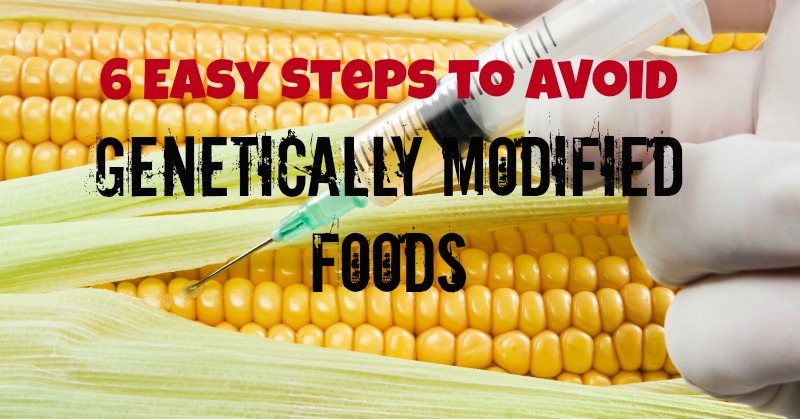Awareness about the presence of genetically modified organisms (GMOs) in the food supply is at an all-time high throughout America, thanks in large part to the Proposition 37 ballot initiative in California. But many people are now asking the question, “If GMOs aren’t labeled, how can I know whether or not the foods I buy contain them?” To help you make the best effort at avoiding GMOs while shopping at the grocery store, here are six recommendations on what to look for and what to avoid.
How To Avoid Genetically Modified Foods
1. Corn, Soy, Cottonseed, Canola
Avoid purchasing foods that contain non-organic soy, corn, cottonseed or canola ingredients. Practically every processed food found in the “middle aisle” section of the grocery store contains some form of soy, corn, cottonseed, or canola, all crops of which are typically GMO if not certified organic. Everything from cookies and crackers to cereals and snack food items contain them, which means you will want to avoid them like the plague.
Common ingredients to specifically watch out for include some of the more obvious ones like high-fructose corn syrup, soybean oil, and canola oil. But several others you will want to be aware of include soy lecithin, an emulsifier added to all sorts of foods, including “health” foods, as well as soy protein, textured vegetable protein, mixed tocopherols (vitamin E), and food starch. Unless certified organic, all of these ingredients are likely GMO.
2. PLU Codes On Fruit & Veg
If PLU code on fruits, vegetables starts with an “8,” avoid such produce. When shopping for fruits and vegetables, your first choice will want to be those labeled with a five-digit PLU that begins with a “9,” which indicates that it is certified organic. Produce items containing a four-digit PLU are considered “conventional,” which means they are not technically GMO, but may still contain pesticides and other toxic residues. The Environmental Working Group (EWG) has created a helpful shopping guide for picking out safe produce.
Produce items you will want to specifically and always avoid are those bearing a five-digit PLU beginning with the number “8,” as these are GMOs. The vast majority of non-organic papaya, as well as several varieties of non-organic zucchini and squash are also of GM origin, so you will want to specifically purchase organic varieties of these foods as well. Genetic manipulators are also now working on a GM apple that does not turn brown, so watch out for any apple that stays unnaturally white when sliced or bruised.
3. Sinister Sugars
Unless added sugar is specifically identified as “cane,” it likely comes from GM sugar beets. At least 90 percent of the sugar beet crop grown in the U.S. is of GM origin, which means if any food product contains “sugar” or some other sugar derivative like glucose or sucrose, it is more than likely a GMO. Always look for “cane sugar,” or preferably “evaporated cane juice,” in order to avoid GM sugar. Raw agave nectar, pure stevia extract, and xylitol are also safe, non-GMO sugar and sugar substitutes.
4. Artificial Sweeteners
If it contains artificial sweetener, it likely contains GMOs. The popular artificial sugar substitute aspartame, which goes by the trade names Equal, NutraSweet and AminoSweet, is produced using GM bacterial strains of E. coli, which means it, too, is a GMO. Anything containing aspartame is a no-no when it comes to food.
5. Ambiguous Additives
Watch out for ambiguous additives like xanthan gum, citric acid, maltodextrin, and other common GMO offenders. Many common food texturizing agents, flavor enhancers, thickeners, sweeteners, and fortifiers are also derived from GMOs. Some of the more common offenders include ingredients like xanthan gum, citric acid, maltodextrin, lactic acid, dextrose, caramel color, baking powder, malt syrup, modified food starch, mono and diglycerides, sorbitol, stearic acid, and triglycerides. The Institute for Responsible Technology (IRT) has created a helpful list of “invisible GM ingredients” that you can reference while shopping.
6. Dairy Products
Avoid any dairy products that are non-organic, or that do not contain a “No rBGH” label. Unless a dairy product is specifically labeled as being certified organic, or as not containing the artificial growth hormone rBGH, which is sometimes labeled as rBST, it likely contains GMOs. Short for recombinant bovine growth hormone, rBGH is created using GMO E. coli just like aspartame, and is used in conventional cattle unless otherwise labeled.
This means that all non-organic yogurt, cheese, butter, milk, and ice cream that does not specifically bear a “No rBGH” label of some sort is likely made with GMOs. Non-organic dairy cows are also likely fed GM feed, which means your best bet is to stick only with certified organic or non-GMO dairy products at all times.
The Non-GMO Project has also developed a certification program by which food manufacturers can uniformly label food products not made with GMOs. Many food products now bear the Non-GMO Project “Verified” label, which will help give you peace of mind that the food you are buying is clean, safe, and free of GMOs.
You might also want to download the FREE 2012 Shopper’s Guide to Pesticides, so that you can take it with you when you go shopping. It highlights the dirty dozen fruit and vegetables that are laden with pesticides and should be avoided unless they are organic, and the clean 15 that are OK to not buy organic if you don’t have access to them, as their pesticide levels are a lot lower.
Source: http://www.naturalnews.com/…
This content will be shown after all post
One Comment